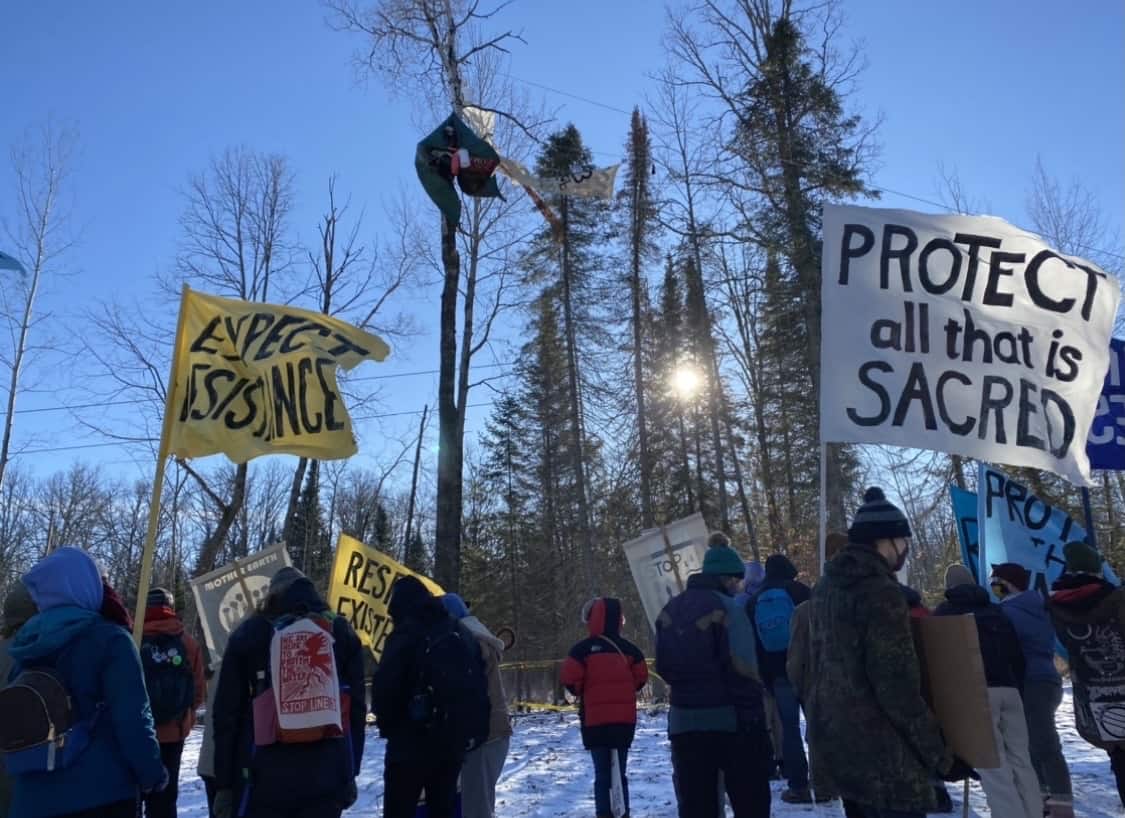Extinction Rebellion US (XRUS), in conjunction with other climate justice partners, is organizing a two week movie screening fundraiser for Indigenous water protectors and an educational panel on Indigenous action at the Minnesota Line 3 resistance sites.
What: The documentary, Necessity: Oil, Water, and Climate Resistance by filmmakers Jan Haaken and Sam Praus, highlights the work of Tara Houska and other Water Protectors who have been fighting Line 3. Please help spread the information about this fundraiser through all of your social media connections and register on Eventbrite.
When: The online movie fundraiser will take place February 5th – February 21st. Registrants can donate on a sliding scale and then watch within that time frame. Proceeds will go to Indigenous water protectors in the Giniw Collective and Miigizi Camp.
In addition to the film screening, there will be a separate zoom educational panel about the Indigenous action to Line 3 in Minnesota. We want to present a first-hand overview of the current Line 3 situation as well as gauge interest in car caravan pods of activists going to join them in early spring. The panel will outline a series of trainings and resources leading up to possible actions. The webinar will take place Monday, February 15th at 5 pm PST. The Zoom link to this event will be sent out to our Eventbrite attendees five days prior to the panel. Click here for more information about our panelists.
Indigenous leaders who are fighting the Line 3 pipeline in Minnesota have put out a call asking folks to come in support of their work on the frontlines to stop Enbridge’s construction of this tar sands project endangering the waterways, defiling the land, and contributing to the climate crisis. The defeat of Line 3 could be a death knell for tar sand pipelines in general as there have already been some flights of funders.
This pipeline will transport for export 1 million barrels of tar sands a day—the equivalent of 50 new coal fired plants. In addition to destruction of Canadian boreal forests, it endangers Anishinaabe and other tribal wetlands and rice fields, the headwaters of the Mississippi, and with 22 river crossings, is at great risk for spills and leakages for which the company has a sordid and non-transparent history.
There is no local market need for this pipeline, and it comes at a time when we need to be transitioning to renewable, sustainable clean energy and decreasing, not increasing, carbon emissions. It is critical to buy time for court challenges to be heard and put pressure on the new administration to weigh in against this horrific project.
Since December, over 44 water protectors have been arrested, and the company is rapidly trying to complete the project. In support of the water protectors’ call for support, COVID-protective caravans are being organized to show up to the frontlines of this historic climate battle.
About the film: Necessity: Oil, Water, and Climate Resistance traces the fight in Minnesota against the expansion of pipelines carrying highly toxic tar sands oil through Native lands and essential waterways in North America. Front line communities–Native Peoples and communities of color–suffer the most immediate and severe consequences of the climate crisis: impacts on physical and mental health as well as territorial desecration and displacement. Yet with painful histories have come deep insights, forms of resilience and modes of resistance. This feature-length documentary follows indigenous leaders and white allies, using direct action to protect the sacred and demand justice. Legal experts discuss the record of disparate treatment in the justice system and the legal strategy of the necessity defense, which makes a moral case for acts of civil disobedience, while medical and scientific experts address the health effects of fossil fuels and dangers of pipeline and refinery infrastructure. Capturing the natural beauty of the region as well as the vulnerability of local habitats, aesthetic and stylistic elements drive the action forward, including animated maps with illustrations. The filmmaking team builds collectively on their training in psychology and anthropology.
Panelist Bios:
Jan Haaken is Professor Emeritus of Psychology at Portland State University, a social justice activist, and documentary filmmaker. Haaken’s films focus on undervalued work carried out on the social margins and in liminal spaces. Haaken won the Lena Sharpe Persistence of Vision Award at the 2019 Seattle International Film Festival and has directed seven feature-length films, including Necessity: Oil, Water and Climate Resistance.
Tara Houska (Couchiching First Nation Anishinaabe) is a tribal attorney, founder of Giniw Collective, and a former advisor on Native American affairs to Bernie Sanders. She spent six months on the frontlines fighting the Dakota Access Pipeline, and is currently engaged in the movement to defund fossil fuels and a years-long struggle against Enbridge’s Line 3 pipeline. She is a co-founder of Not Your Mascots, a group committed to positive representation of Native peoples. She is a TED speaker, the 2017 Harvard “Public Interested” keynote, received an “Awesome Women Award” from Melinda Gates, a 2019 Rachel’s Network Catalyst Award and is featured in “Women: A Century of Change” by National Geographic. Tara has written for the women-led climate anthology “All We Can Save”, the New York Times, the Guardian, Vogue, and Indian Country Today. She lives in a pipeline resistance camp in Northern Minnesota.
Taysha Martineau Two spirit Indigenous anarchist, Fond Du Lac Band Member, founder of Camp Miigizi, co-Founder Gitchigumi Scouts.
Jessica Garraway has worked as a substitute teacher for three years. She has been organizing and writing on matters such as wealth disparity, racism, LGBT liberation, women’s liberation, and environmental issues for over 10 years. She has been active in the fight against police brutality through participation in demonstrations and trainings focused on direct action and police abolition. In recent years her work has been predominantly focused on environmental/climate justice. She was a participant in the fight to stop the building of what would have been the first Tar Sands mine in the US, the Keystone, and the Dakota Access pipelines. Jessica was a founding member of the Mississippi Stand mobile caravan that cost the company Energy Transfer millions of dollars through a number of lockdowns to equipment and blockades. Her current work is focused on stopping the Line 3 pipeline through Minnesota and being involved in the Worker’s Defense Alliance and her Extinction Rebellion chapter. Follow Jessica on twitter @Deeplyjessica
Moderator: Jasmine Eppelsheimer works in the field of affordable housing in Portland, OR and is interested in how the housing system can be part of the climate agenda. She completed a bachelor’s degree in philosophy 2016 with an emphasis in international ethics. Jasmine started working as a producer on the Necessity: Oil, Water and Climate Resistance in 2018, drawn to this project having grown up in North Dakota as a person of color and exposed there to the unjust treatment of Indigenous peoples. Her work on the team focuses on developing community screenings and presenting the film at workshops for social justice educators in Seattle, Washington and Surrey, British Columbia.

